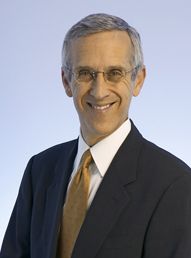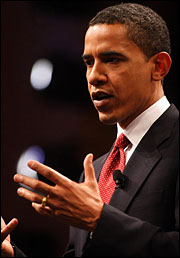international treaties
-
U.S. climate envoy tells international gathering all the right things about climate
If you’re looking for rays of hope amidst the torrent of idiocy and bad news — not that I’m projecting — you could do worse than reading U.S. Climate Envoy Todd Stern’s speech to the recent international climate gathering in Bonn, Germany. How’s this for a rousing beginning? I am pleased to be here in […]
-
Obama calls for climate summit of the world’s biggest polluters
President Obama on Saturday announced that the United States is initiating a Major Economies Forum that will focus on energy and climate change, an attempt to bring the world’s biggest polluters together to discuss a path forward. “The Major Economies Forum will facilitate a candid dialogue among key developed and developing countries, help generate the […]
-
In lead-up to Bonn climate talks, U.S. and U.N. leaders are cautiously optimistic
Climate leaders in both Congress and the United Nations are optimistic about making landmark progress on an international climate accord this year, but hopes that an agreement will be finalized in 2009 seem to be dimming. Yvo de Boer, the U.N. climate chief, and Rep. Ed Markey (D-Mass.), chair of the Energy and Environment Subcommittee […]
-
International mercury pact shows that India and China will follow our lead
The news that the Obama administration is on board with an international pact to significantly decrease mercury use is fantastic for those of us committed to switching from dirty coal power to clean, renewable energy sources.
This is a bold step for the U.S. -- one that is a long-time coming for coal-fired power plants. Coal plants are one of the largest sources of man-made mercury pollution in the U.S.
Mercury pollution causes brain damage and other developmental problems in unborn children and infants, and it has been linked to a greater risk of coronary heart disease in men. A Centers for Disease Control and Prevention study found that 8 percent of women had mercury blood levels exceeding the level deemed safe for unborn children by the Environmental Protection Agency. Our mercury regulations should be strict to protect public health and the environment.
Yet it was this quote from the Washington Post article on the international mercury treaty that stuck out to my colleagues and me: "Once the administration said it was reversing the course set by President George W. Bush, China, India and other nations also agreed to endorse the goal of a mandatory treaty."
For too long we've heard the regulation nay-sayers use the excuse that whatever restrictions and regulations we introduce will only hurt the U.S. economically because China and India will not do the same. This mercury treaty shows the reality: If the U.S. acts first, then China and India will follow.
This bodes well for carbon legislation. The U.S. must act first on carbon regulation. China and India will follow our lead.
-
What will Obama say about climate change in tonight’s big speech?
Buzz around D.C. is that President Obama will address climate change and energy policy in his speech to a joint session of Congress Tuesday night — amid, you know, all those other things weighing on the new commander in chief. And folks are already parsing what it means if Obama includes revenues from the auction […]
-
Two encouraging signs that global climate treaties might be having the intended effect
Although rumors of its death may be exaggerated, the Kyoto Protocol hasn't so far been anyone's idea of a rip-roaring success. The question remains: is the international treaty fundamentally flawed, or is it a fixer-upper that bureaucrats are slowly tweaking into an effective carbon-fighting regulatory framework?
Two pieces of recent evidence boost the fixer-upper view. The first is a report from a prominent research group suggesting that a large part of the European Union's drop in carbon emissions last year are attributable to the cap.
EU emissions dropped by 3 percent in 2008. According to New Carbon Finance, 40 percent of this drop is due to Kyoto. Another 30 percent is due to the recession. Much of the drop came from a switchover from coal to natural gas.
To be sure, this is a modest improvement. The drop itself is small, and natural gas is still a fossil fuel. Nevertheless, this is how a carbon price works: gradual, steady pressure yields incremental movement toward cleaner technologies. The mechanism appears to be sound, and legislators are presently engaged in the political task of making the cap more stringent.
-
Senate Foreign Relations Committee leaders urge action to avoid deforestation
Sens. John Kerry (D-Mass.) and Dick Lugar (R-Ind.), leaders of the Senate Foreign Relations Committee, called on Monday for action to prevent deforestation and thereby slow down climate change. Clearing and burning forests accounts for 20 percent of global carbon dioxide emissions. “There’s no point in words. It’s time for action,” Kerry told the crowd […]
-
A proposal to integrate international and domestic climate policy development
Joe Romm is fond (well, maybe "fond" isn't the right word) of saying that there's no way a substantial international climate treaty could get to 67 votes in the U.S. Senate, which is the constitutional requirement for such treaties. And he's right. This is an enormous barrier not only to ratifying but to developing such a treaty -- why should the 150+ countries involved in international climate negotiations deal with us in good faith when they know there's no way we can follow through?
Last week, William J. Antholis and Nigel Purvis of the Brookings Institution offered some intriguing thoughts about how to get around this dilemma.
They propose a "Climate Protection Authority" that would work like so:
First, in consultation with Congress, the president would decide that future climate and energy agreements are to be approved by the United States by statute rather than as treaties. Statutes require a majority in both houses of Congress, whereas treaties require two-thirds of only the Senate. Federal courts have repeatedly upheld the constitutionality of bicameral statutory approval of international pacts. In fact, the United States enters into more international agreements this way than by treaty, including some arms control agreements and environmental pacts and almost all trade deals.
Second, Congress should spell out in cap-and-trade legislation the conditions necessary for U.S. participation in new climate and energy agreements. For example, it should describe the role we envision for China, India and other major developing countries.
Third, cap-and-trade legislation should preapprove new climate and energy agreements that meet these congressional preconditions. Agreements that do should come into effect for the United States either without further congressional review or pursuant to the streamlined approval process Congress has used for most trade agreements.No. 2 sounds a bit high-handed to me. Perhaps India and China might like to have some say in the role the play, no?
But the basic idea -- lowering the barrier to treaty approval and integrating international negotiations into the domestic policy process -- seems well-worth pursuing.
-
Clinton taps Todd Stern as her climate envoy
Secretary of State Hillary Rodham Clinton today announced that Todd Stern will serve as her special envoy for climate change, signaling that the issue will be a key one for her department.
In this role, Stern will be the country's lead climate negotiator at the United Nations and other international summits.
"President Obama and Secretary Clinton have left no doubt that a new day is dawning in the U.S. approach to climate change and clean energy. The time for denial, delay and dispute is over," said Stern at a press conference today announcing his appointment.
"Containing climate change will require nothing less than transforming the global economy from a high-carbon to a low-carbon energy base," he said. "But done right, this can free us from our dependence on foreign oil and become a driver for economic growth in the 21st century."
Stern, who served as an adviser to the Obama transition team on environmental issues, was an assistant and staff secretary to Bill Clinton from 1993 to 1998. He was the senior White House negotiator for the Kyoto negotiations and coordinated the administration's Initiative on Global Climate Change from 1997 to 1999. From 1999 to 2001, he worked at the Department of Treasury as an adviser to the secretary. He was an adjunct lecturer at Harvard's Kennedy School of Government and a fellow at the German Marshall Fund after leaving government.
Stern now works as a senior fellow at the Center for American Progress, where he focuses on climate change and environmental issues. He drafted a proposal for creating a National Energy Council, an idea published in CAP's Change for America: A Progressive Blueprint for the 44th President. He is also a partner at the law firm of Wilmer Cutler Pickering Hale and Dorr, where he is the vice chair of the firm's Public Policy and Strategy practice.
Stern's background on both the climate issue and the inner workings of the White House signal that he's likely to play a big role in international negotiations for the State Department, and that it will be a key issue under the new Secretary of State.
Clinton echoed as much in her remarks today: "With the appointment today of a special envoy, we are sending an unequivocal message that the United States will be energetic, focused, strategic and serious about addressing global climate change and the corollary issue of clean energy."
It's an open question, however, how Stern will coordinate his actions with Carol Browner, the White House's top adviser for climate and energy issues.

